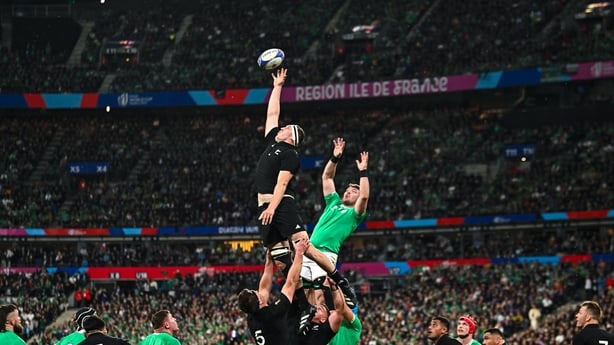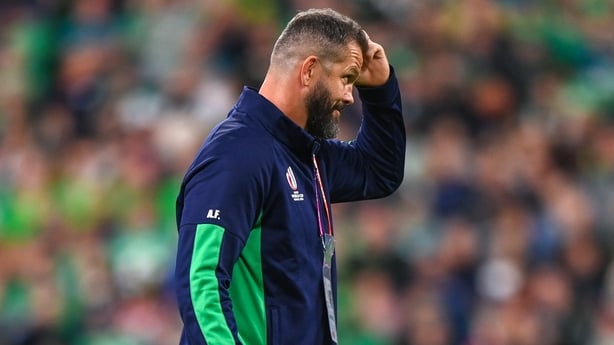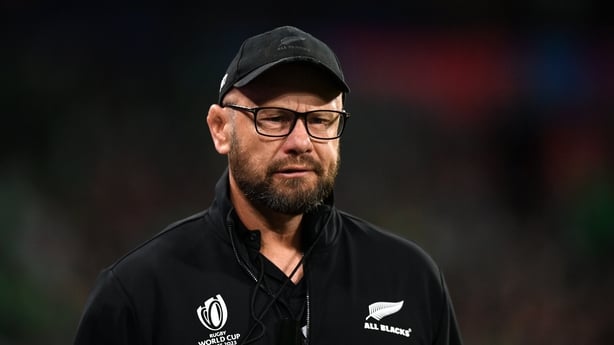As he reflected on Saturday night's World Cup elimination to New Zealand, Andy Farrell mentioned the "fine margins" that ultimately decided the quarter-final defeat.
A piece of defensive brilliance for Jordie Barrett to hold Rónan Kelleher up over the line on 72 minutes was the big one, while a bounce of a ball on 43 minutes that whizzed the tips of Dan Sheehan's fingers as he charged for the line could have changed the game early in the second half.
"Ifs, buts and maybes," was how Farrell described the fraction of luck that could have tipped the scales in Ireland's favour. Other days, those things fall you way.
Very little separated Ireland and New Zealand on Saturday, but the big difference was how little luck the All Blacks needed.
While they scored three well-worked tries there wasn't much flash to the performance. They kicked far more than Ireland, and did so brilliantly. Will Jordan and Leicester Fainga'anuku got the better of the Irish backfield in the sky, while Richie Mo'unga and Beauden Barrett varied their kicking in the opening half with two delicate chips in behind the defence, one of which led to their opening try.
Their back row of Sam Cane, Ardie Savea and Shannon Frizell won the battle at the breakdown, while they had Caelan Doris marked from minute one, Cane in particular hitting the Irish number 8 with two ferocious tackles, the second of which led to the penalty that Jordie Barrett kicked to make it 6-0.

Aside from a couple of errant passes and sliced kicks in the opening two minutes, their performance was as error-free as you could get in a game of this magnitude; just three turnovers conceded across the 80 minutes, while they didn't allow Ireland a single put-in to the scrum.
On their own scrum and lineout ball they were perfect, retaining all 13 of the set-pieces and laying the foundation for their win.
Throughout Ireland's 17-game winning run, both scrum and lineout have struggled for consistency. The statistics will show Ireland lost just one of their 15 lineouts but in reality that number should be three - two stolen throws by New Zealand were won back by Ireland almost instantly. While they did retain possession, it became scrappy and denied them the opportunity to launch fluid attacks.
The big frustration will be around the scrum, where Andrew Porter was penalised three times on just five drives by referee Wayne Barnes, each time for driving in at an angle. It was clear the Irish players and management didn't agree with the interpretation of referee Wayne Barnes.
Speaking after the game, Farrell (below) said: "We've a different view to what was going on out there [in the scrum] but we don't want to sit here and have sour grapes."

Likewise, Peter O'Mahony didn't agree with the decisions against Porter: "To be honest, from our point of view, I thought our scrum felt really good. That's something that we’ll talk about on a different day."
Paul O'Connell also hinted at the frustrations: "I haven't really watched it back but that was my impression of the game, that they were quite disciplined. I’d like to see the scrums again."
The Irish management will get feedback from the match officials in due course, but none of it will change the result.
It's an issue that has cropped up before. Against England at Twickenham in 2022 their scrum was whistled off the pitch by referee Mathieu Raynal, while they had similar issues in their first Test defeat to the All Blacks later that year. In the weeks after each of those games, they were given feedback that some of the decisions were harsh. Whether those calls from Barnes were correct or incorrect on Saturday, the best teams in the world need to be able to adapt to the referee in-game.
Having conceded a penalty off the only scrum in the first half on Saturday, when the sides were preparing to pack down for the first scrum of the second half Tadhg Furlong could be heard speaking to Barnes about whether they looked back over that decision at half time.

Barnes: "We did."
Furlong: "What did you think?"
Barnes: "We thought it was right."
The scrum that followed went off without a hitch, but when they packed down again two minutes later, Porter's drive on Tyrel Lomax was dominant, but in the eyes of Barnes, illegal.
When it comes to scrummaging, perception is reality. Barnes may have been right or Barnes may have been wrong, but his three decisions were at the very least consistent, and it's on Ireland to be able to react and adapt in the moment by being less aggressive in trying to force a turnover.
It's the same as adapting to the officials at the breakdown or around offside; establish what they're hot on and work from that template.
The scrums that went against them all big impacts. The first allowed the All Blacks escape from their own 22 in the opening couple of minutes, and resulted in that ferocious 28-phase attack before they went 3-0 in front.
The second arrived just as Ireland were gaining momentum in the early stages of the second half, while the third came just after they had scored their penalty try to get back to 25-24. Jordie Barrett's kick at goal may have gone wide, but it slowed down Ireland's flow and allowed the All Blacks shave time off Codie Taylor's yellow card.
It was a game of fine margins, but plenty of those margins were well within Ireland's control.








